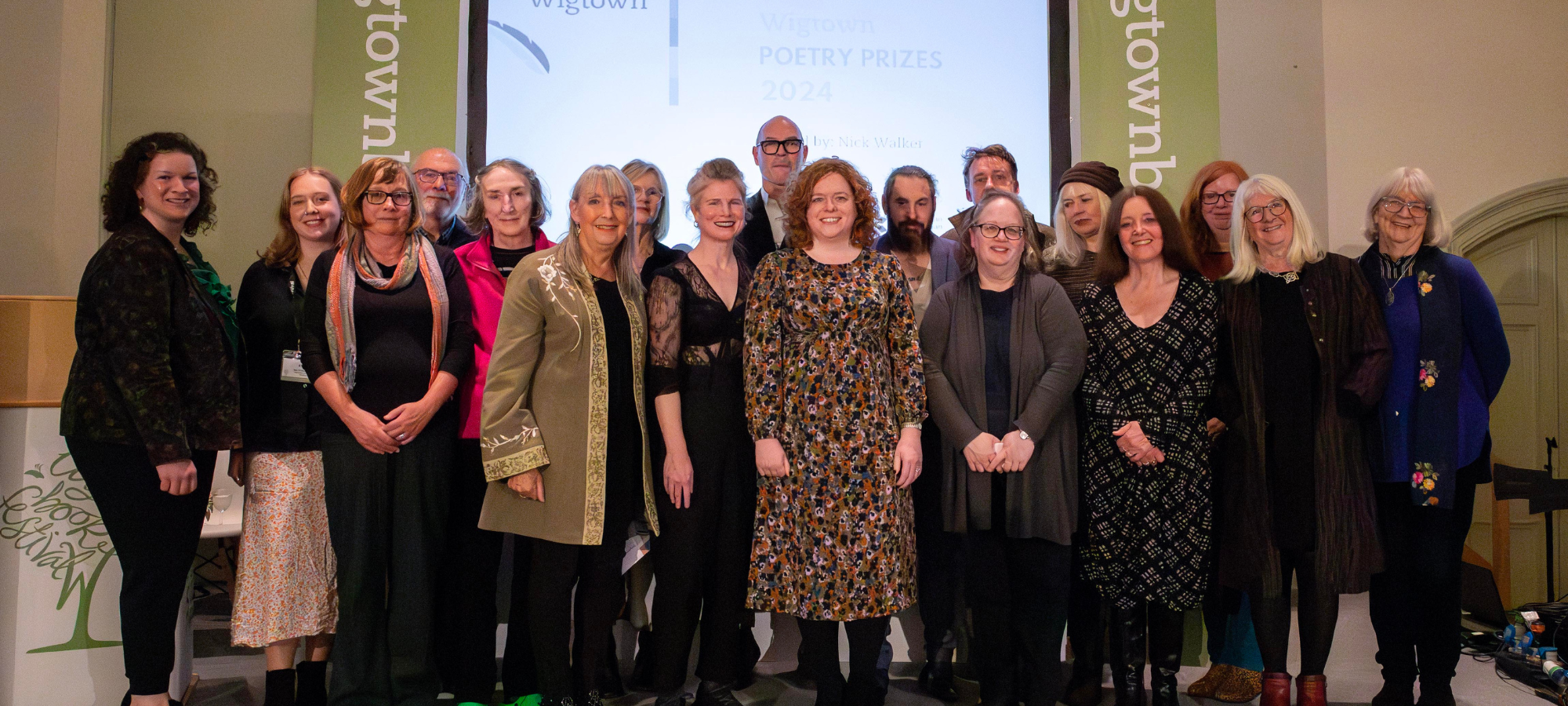
Wigtown Poetry Prizes Winners Revealed
5 October 2024
- Celebrating poetry in Scotland’s three indigenous languages
- Prizes awarded at a special event during the Wigtown Book Festival
The winners have been unveiled for the 2024 Wigtown Poetry Prizes – which celebrate work in the nation’s three indigenous languages.The annual international awards include the Wigtown International Poetry Prize, open to entries in English, Gaelic and Scots, plus separate awards for Gaelic and Scots poetry.
There is also prize for the best collection of works, and a Fresh Voice award for poets in or from Dumfries and Galloway.
The results were announced at a special event held yesterday evening (4 October) at Wigtown Book Festival.
Nicholas Walker, Wigtown Poetry Prize Group Chair, said: “Poetry is clearly alive and well around the world, with over 500 entries; within this though, the 99 Alastair Reid Pamphlet Prize entries represent about 1,000 poems altogether.
“We were impressed to have poets entering not just from Scotland and other parts of the UK but also from places as far apart as Australia, New Zealand, USA, Germany and France. Our judges had their work cut out for them narrowing entries down to shortlists, let alone deciding on winners and runners up.
“This year, for the first time, the International Prize has joint winners as it was simply not possible to choose one over the other. We are grateful to poets for continuing to write and to enter, to our judges for taking this on and to our sponsors for their ongoing support.”
The winners and runners up are:
Wigtown International Poetry Prize
- Joint Winner: Cracked - Magi Gibson, from Glasgow (£850)
- Joint Winner: Homosexual - Marcas Mac an Tuairneir, from Edinburgh (£850)
Judge, the writer, actor and director Gerda Stevenson, said every poem on the shortlist was of a high quality and deserved recognition.
Of Marcas’ poem she said:
“This poem takes a single word, in this case the poem's title, and uses it to explore the nature of that identity and the fundamental necessity of that word for the person in whose voice the poem speaks. That single word goes on a journey through each stanza, from taboo, loss and fear to open celebration. The language is intense, rhythmic with vivid imagery, emotionally naked, yet never sentimental.”
Speaking about Magi’s poem she said:
“Her poem is beautifully crafted … constructed as a series of couplets in deceptively prosaic everyday language, yet the imagery is vividly heightened, surreal at times. The result is a poem urgently of our time, one that resonates universally.”
Receiving his award Marcas spoke about his and Magi’s success:
“I want to say a couple of words about the incredible woman who just read her winning poem, who's been an inspiration to me for a number of years and has supported me for a very long time as a writer. I have to admit that with the first draft of this poem, I sent it to Magi, and she gave me feedback. And so I owe her a lot. So, this is the ideal result for me.”
Wigtown Scottish Gaelic Prize (Supported by The Gaelic Books Council)
- Winner: Fianais, Rònaigh an Taibh - Rody Gorman, Isle of Skye (£500)
- Runner up: Crìoch cànain - Mona Claudia Wagner, from Germany (£200)
Peter Mackay, who judged the prize, said:
“Bha na dàin a chaidh a chur a-steach do dhuaisean Baile Ùige am bliadhna-sa a' dearbhadh cho fallain agus farsaing 's a tha bàrdach sa chànan, le bàird à iomadh dùthaich a' sgrìobhadh gun eagal agus gun chrìochan. 'S e gearr-liosta gu math laidir a bh'ann, agus cnap math eile ann a bha airidh air moladh - ach b' iad na dàin aig Rody agus Mona a thug an tlachd as motha dhomh fhìn.”
Peter Mackay, who judged the prize, said:
“It's hugely important that Gaelic has a place at Wigtown, and the historic strength of the language in the area is recognised in the celebration of contemporary Gaelic poetry.“
The Gaelic poems submitted to Wigtown this year showed how diverse and strong poetry in the language is just now, with lots of poets writing ambitious, daring work. It was a strong shortlist, and there were many others worthy of high praise - but it was a delight, in particular, to read Rody's and Mona's poems.”
Alison Lang, Director of the Gaelic Books Council, said: “Às leth Chomhairle nan Leabhraichean, bu mhath leam taing mhòr a thoirt do na britheamhan agus don sgioba aig Baile na h-Ùige airson cothrom a thoirt do bhàird Ghàidhlig tron fharpais chliùiteach seo. Tha na dàin a chaidh a chur a-steach am-bliadhna a’ dearbhadh cho fallain ’s a tha sgrìobhadh bàrdachd san latha an-diugh agus a’ taisbeanadh tàlant nam bàrd a thàinig troimhe dhan gheàrr-liosta, agus tha Rody Gorman, Mona Claudia Wagner rim moladh gu mòr. Mealaibh ur naidheachd.”
Alison Lang, Director of the Gaelic Books Council, said: “On behalf of Comhairle nan Leabhraichean, I would like to thank the judges and the Wigtown team for the opportunity that this prestigious prize presents for Gaelic poets. This year’s entries demonstrate the vigour of contemporary poetry and the talent of the shortlisted poets, and Rody Gorman and Mona Claudia Wagner deserve high praise and our most sincere congratulations.”
Wigtown Scots Prize (Supported by Saltire Society)
- Winner: Loch Awe – Lesley Benzie, from Glasgow (£500)
- Runner up: A Black Ex-Miner Caas Doon the Miners' Raws – Robert Duncan, Newcastle upon Tyne (£200)
Ann MacKinnon, who judged the award, said: “The winning piece, Loch Awe, captured a moment in time. It was an adventure but so much more with its references to kelpies and spectres. It had a feeling of fear but also fun. Each time I read it I found a little more in it and was glad that they got 'a safe passage back tae shore’.”
“The second piece, A Black Ex-Miner Caas Doun the Miners' Raws, used very rich Scots to good effect as it captured the end of an era. It was a hard life the miners had and the houses tell the stories of their lives. There is good use of alliteration and assonance in the poem as in 'Stievely, siccarly, He swings his forehaimmer’.”
Mairi Kidd, Director of the Saltire Society, said: “We were delighted to see the range of work submitted in Scots for the prize and the winner and runner-up, in their very different ways, demonstrate the health of writing in the leid. Loch Awe is a really interesting poem drawing effectively on folklore and playing (appropriately enough) with depths and shallows. Congratulations to Lesley and to Robert on their achievement."
Alastair Reid Pamphlet Prize (In memory of one of Scotland’s foremost literary talents)
- Winner: I Go To The Devil - Sarah Gibbons from London (The prize is for 30 pamphlets set by Gerry Cambridge and printed by J&B Print in Newton Stewart).
Praising the winner, judge Gerda Stevenson said: “Sarah Gibbons’ pamphlet is a series of verses, an imagining of the inner and outer worlds of the renowned Isabelle Gaudi, a woman who confessed to witchcraft in 1662. The language in Gibbons’ pamphlet is finely wrought, vividly realising the psychology of a woman on the edge of extremity. The poet brilliantly blends the sometimes surreal imagination of Gaudi a Sabbath breaker within a deft depiction of a harsh life and landscape.”
Dumfries & Galloway Fresh Voice Award
- Winner: In between places – Suzannah Goss, from Edinburgh – who wins support and a place on a course at Moniack Mhor to help further develop her poetry.
Liz Niven, who judged the Fresh Voice Award, said: “I was hoping to find poetry to engage with, richness of subject matter and imagery alongside attention to structure. I found all this and more from the entrants to the Fresh Voices Award.
“The poets had also provided a series of interconnected poems, clearly working towards a pamphlet of work and aware of the requirements of the competition.”
This year saw 530 entries submitted from all round the world. The prizes date back to 2005 and have become recognised as Scotland’s international poetry awards. Wigtown Festival Company is grateful for the continuing support for the Wigtown Poetry Prizes from the Gaelic Books Council / Comhairle nan Leabhraichean, Saltire Society, StAnza, Moniack Mhor and Scottish Poetry Library.
- Full details at www.wigtownpoetryprize.com
- ENDS -
Notes to editors
The 2024 Wigtown Poetry Prizes shortlistsWigtown International Prize
- Wandering Stars, Jane Frank
- Cracked, Magi Gibson
- The Obituary of Megan Boyd, Louise Greig
- Homosexual, Marcas Mac an Tuairneir
- Matter, Kristen Mears
- Inversion Layers, Jilly O’Brien
Wigtown Gaelic Prize (Supported by The Gaelic Books Council)
- Bana-bhuidsich Allt a’ Mhuilinn, Ceitidh Campbell
- Fianais, Rònaigh an Taibh, Rody Gorman
- Pràiseach, Marcas Mac an Tuairneir
- Immram, Taylor Strickland
- Crìoch cànain, Mona Claudia Wagner
Wigtown Scots Prize (Supported by Saltire Society)
- Loch Awe, Lesley Benzie
- A Black Ex-Miner Caas Doon the Miners' Raws, Robert Duncan
- Sit In Yir Ain Licht, Rob McClure
- Karneval, Shane Strachan
- Whaun She is Done, Lynn Valentine
Alastair Reid Pamphlet Prize (The prize is in memory of one of Scotland’s foremost literary talents)
- I Go To The Devil, Sarah Gibbons
- wOmen’s wOrk, Jennifer Harrison
- The Broken Smashed Rubble of Everything I Owned, Wes Lee
Dumfries & Galloway Fresh Voice Award
- Wednesday Afternoons: Agnew Park, Jane Fuller
- In Between Places, Suzannah Goss
- Watery Limits, Diane Schofield
About the Wigtown Poetry Prizes
Founded in 2005 and refreshed and rebranded in 2019, Wigtown Poetry Prizes welcome entries from poets wherever they may live. Separate categories celebrate the best of Scottish Gaelic and Scots language poetry, a special category acknowledges a rising talent in Dumfries & Galloway, and a pamphlet prize is named in memory of Alastair Reid - local poet and one of Scotland's foremost literary figures.
- Website: www.wigtownpoetryprize.com
- Email: [email protected]
- This year’s competition takes place in association with:
- The Gaelic Books Council https://www.gaelicbooks.org
- Moniack Mhor Creative Writing Centre https://www.moniackmhor.org.uk
- Saltire Society https://www.saltiresociety.org.uk
- Scottish Poetry Library https://www.scottishpoetrylibrary.org.uk
- StAnza, Scotland's International Poetry Festival http://www.stanzapoetry.org
About The Gaelic Books Council
Comhairle nan Leabhraichean (The Gaelic Books Council) is the lead organisation with responsibility for supporting Scottish Gaelic authors and publishers, and for raising the profile and reach of Scottish Gaelic books in Scotland and internationally. Established in 1968, Comhairle nan Leabhraichean is a registered charity and receives support from Creative Scotland and from Bòrd na Gàidhlig.
About The Saltire Society
The Saltire Society seeks to encourage everything that might improve the quality of life in Scotland. It works to preserve all that is best in Scottish traditions and to encourage new developments which can strengthen and enrich the country’s cultural life. It acts as a catalyst, celebrant and commentator through an annual programme of awards, lectures, debates and projects. Founded in 1936 is a non-political independent charity with membership branches throughout Scotland.
About StAnza
StAnza's mission is to celebrate poetry, to bring poetry to audiences and to enable encounters with poetry. The organisation works all year round to deliver poetry events and projects in Scotland and beyond. Its main focus is the annual festival in St Andrews each spring and it is recognised as one of the leading poetry festivals in the UK and Europe. StAnza also actively promotes readings in foreign or minority languages and has featured poets reading in many of the national languages of Europe, as well as in regional languages and dialects. We regularly include Gaelic and Scots language poets.
For media information and interview requests contact Matthew Shelley on 07786 704299 or [email protected]
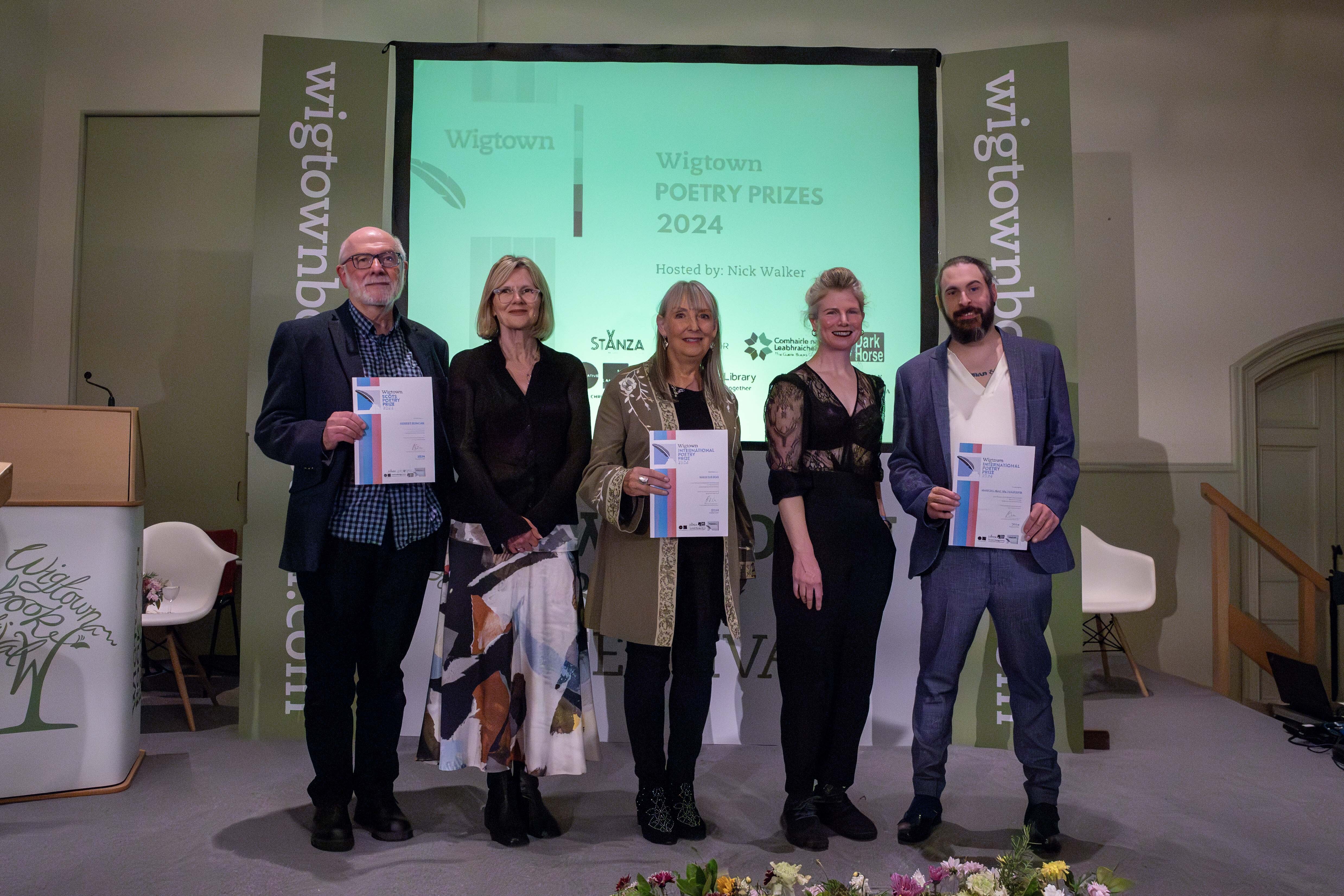
From left Robert Duncan Lesley Benzie Magi Gibson Sarah Gibbobs and Marcas Mac an Tuairneir by Colin Tennant
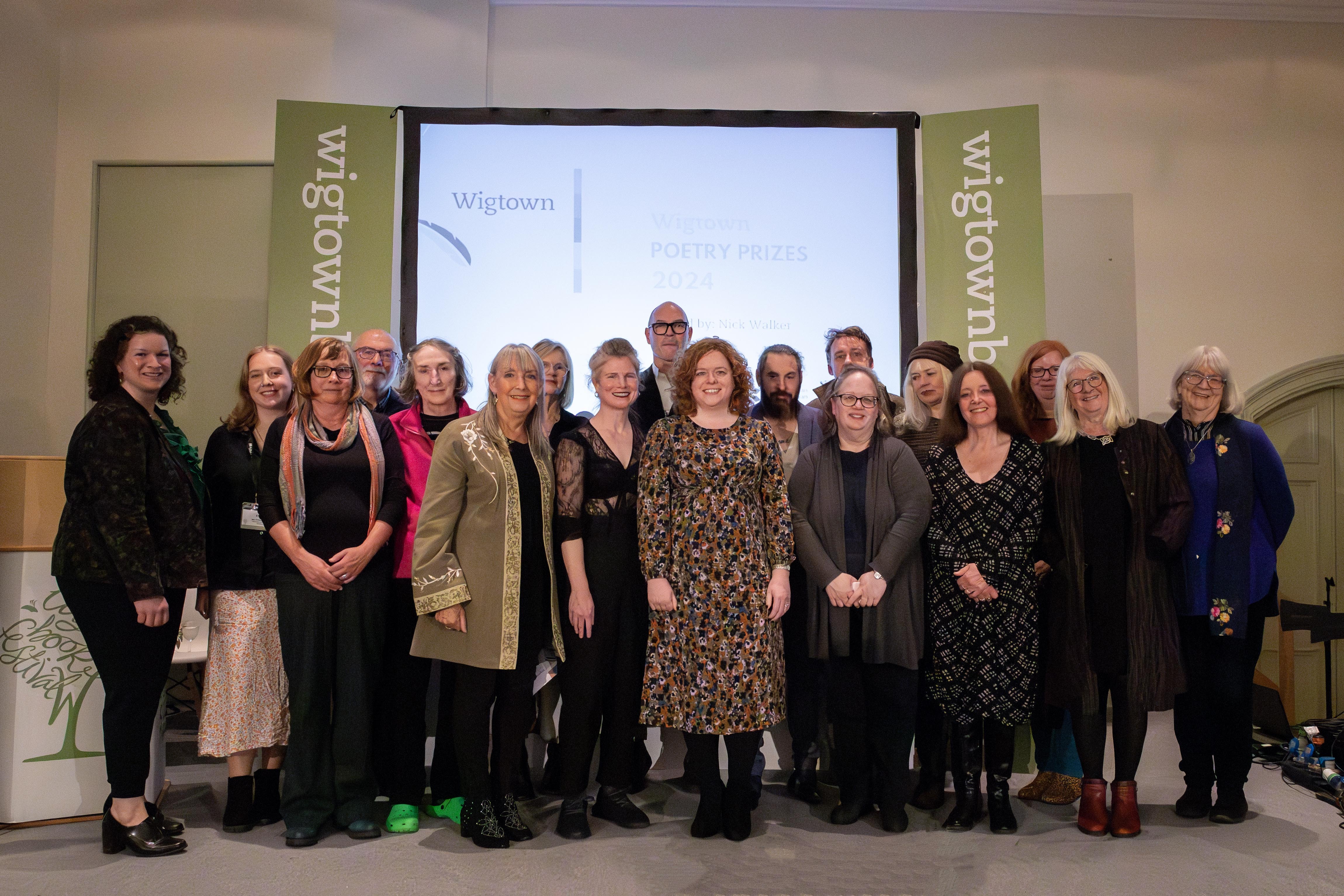
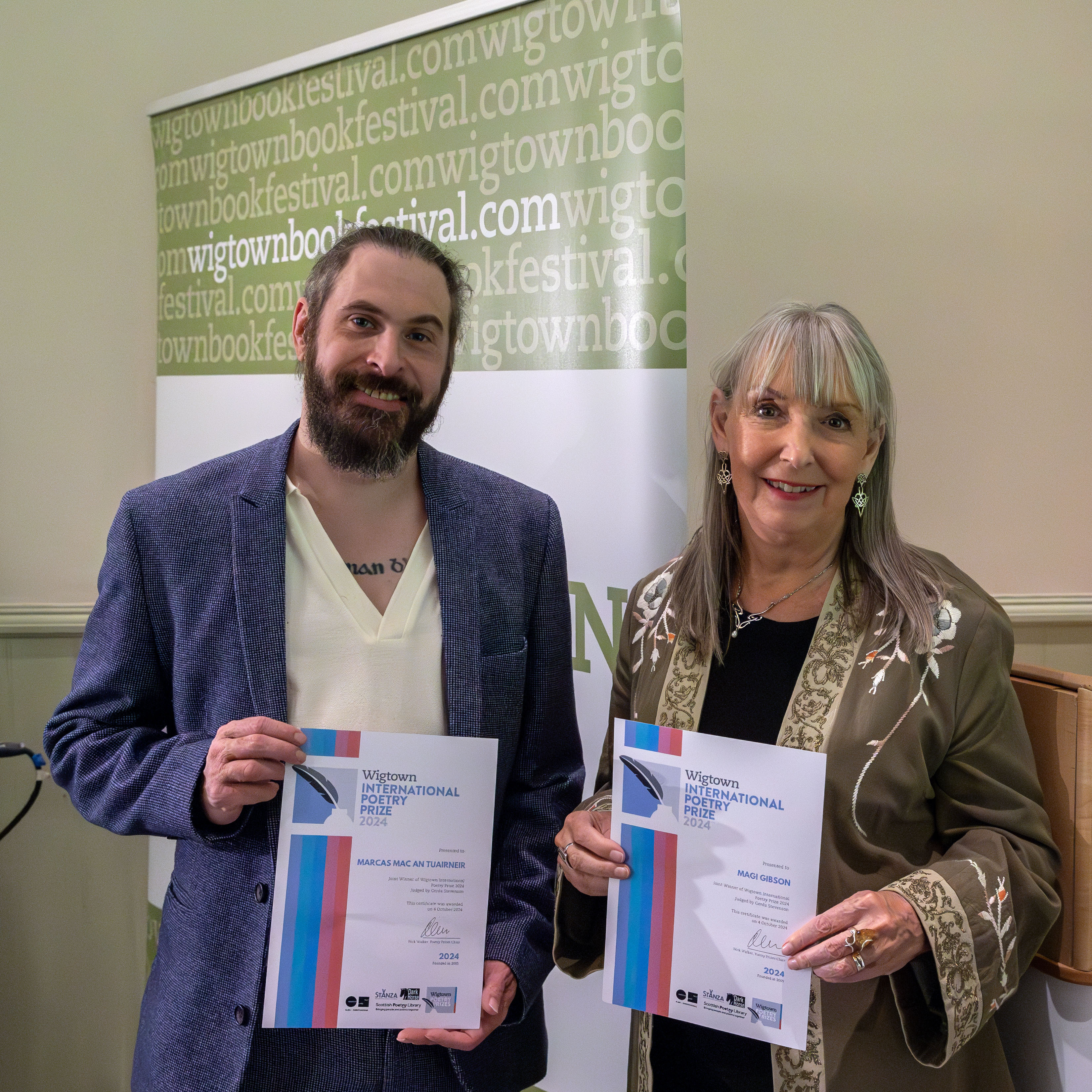
Wigtown International Prize winners Marcas Mac an Tuairneir and Magi Gibson by Colin Tennant
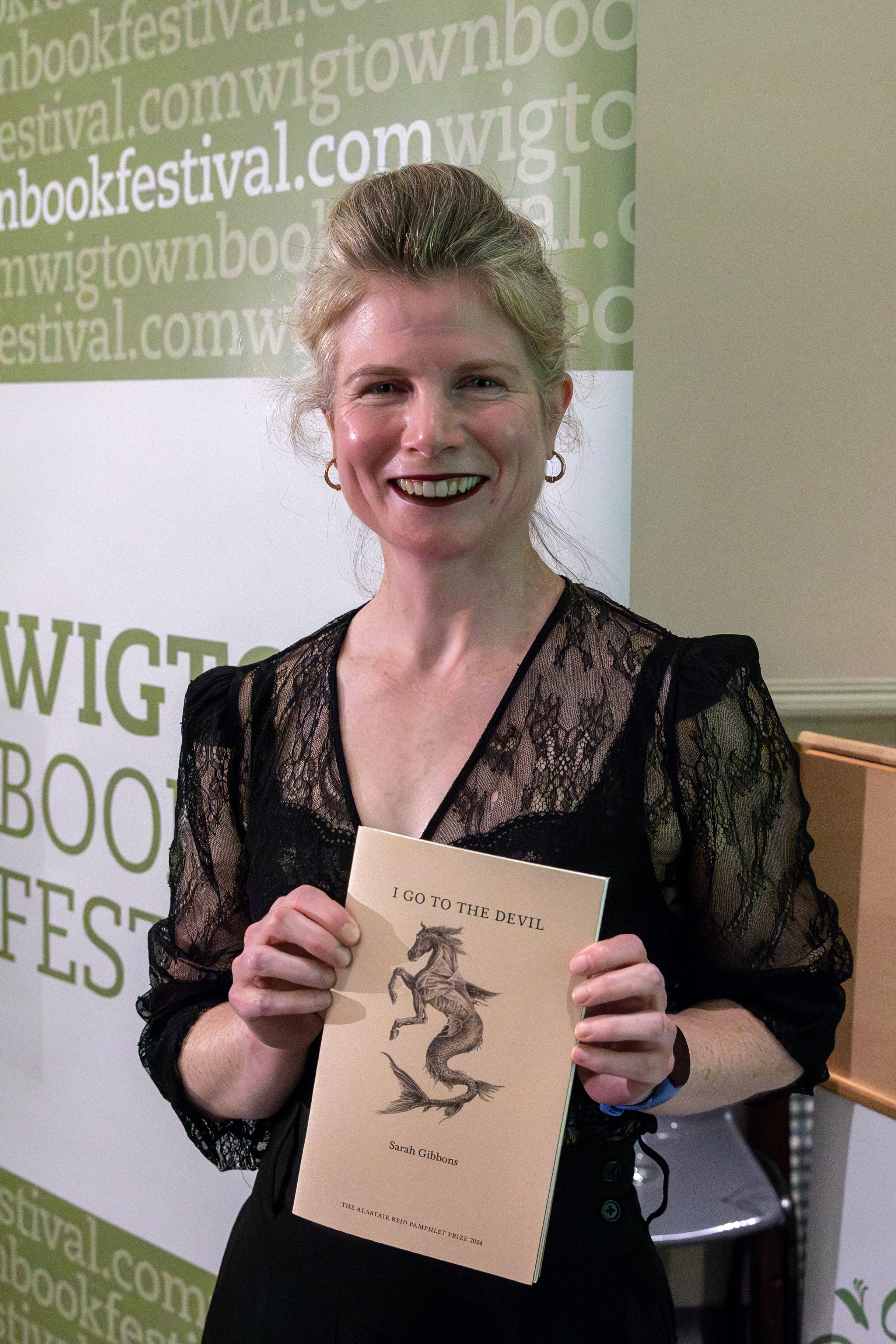
Sarah Gibbons, Alastair Reid Pamphlet Prize winner, by Colin Tennant